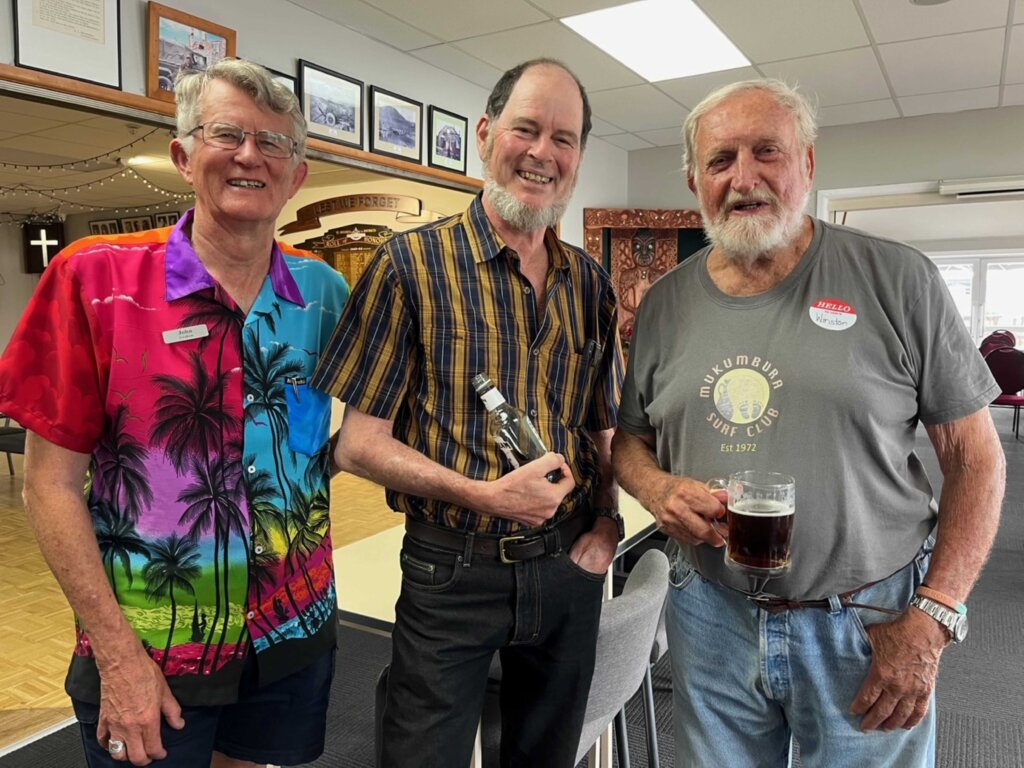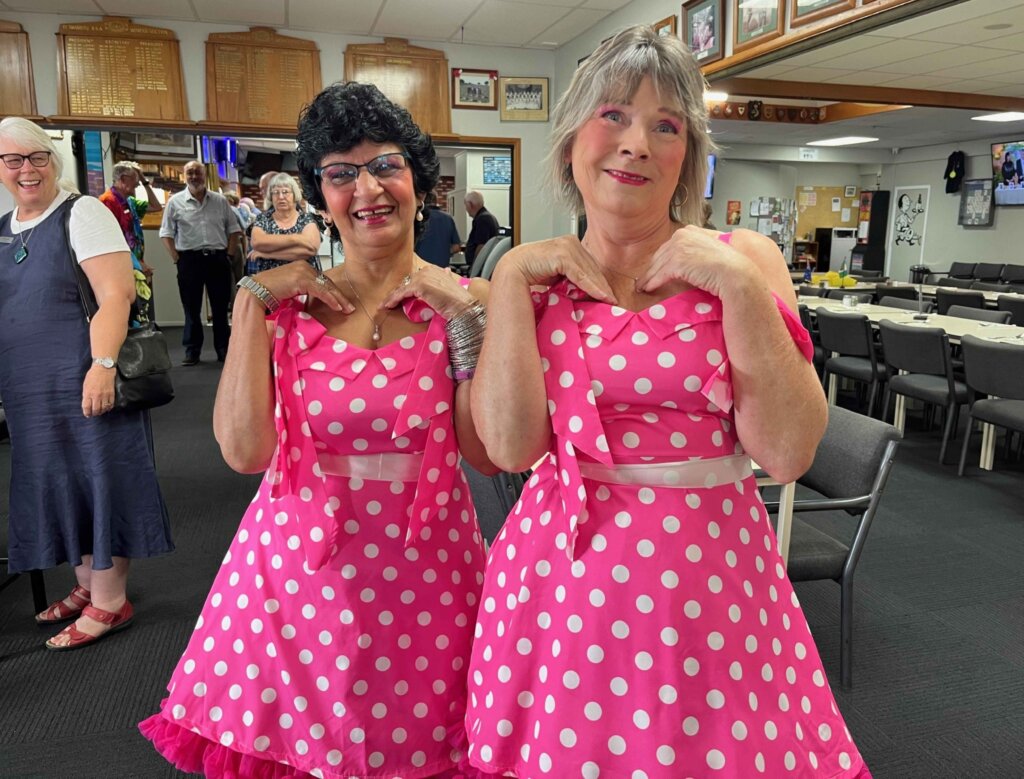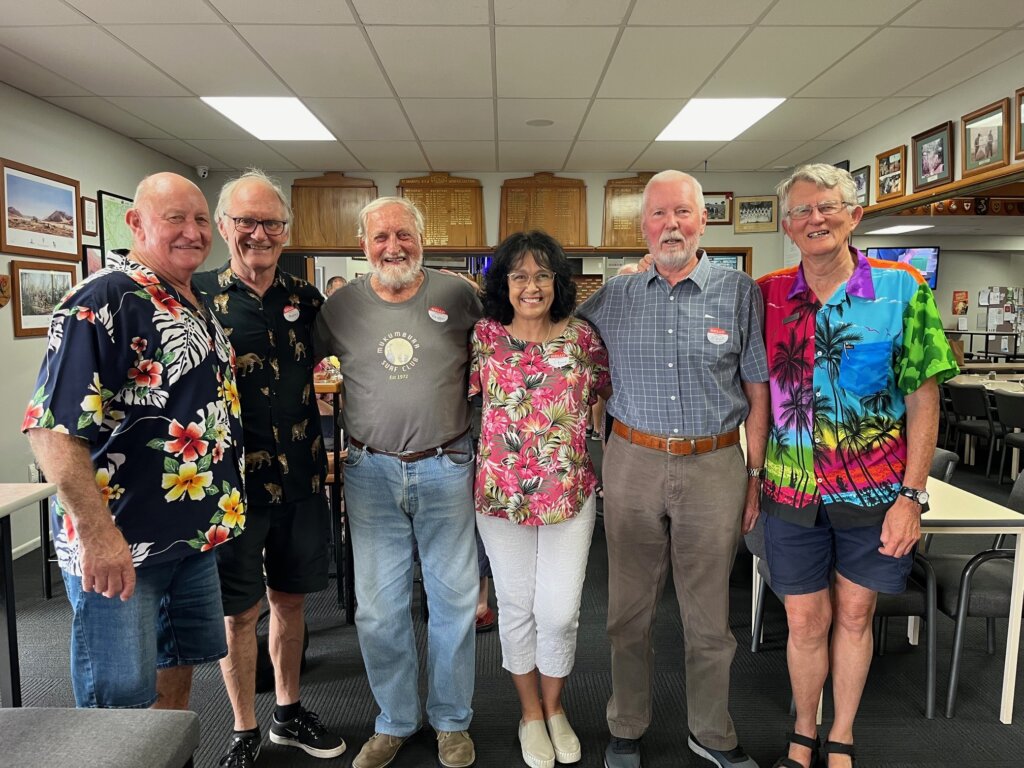
Celebrating mateship are, from left, Eight Ball Group members John Graham from Te Awamutu, Phil Marcou from Waihi, and group founder Winston Hart from Cambridge.
Members of the Eight Ball Group are used to being quizzed on the origins of their name.
The reason has more to do with physiology than pool, it seems, because the four men who started it in Cape Town in the early 1980s decided ‘Eight Ball’ was a fitting tribute to their gender.
Unsurprisingly, the name has been the butt of more blushes than a Billy Connolly skit. Their roots, however, have a more serious backstory.
They formed the original Eight Ball Group as a friends-based gathering for ex-Rhodesian (pre-Zimbabwe days) and South African service personnel. Numbers grew fast to include a swathe of professions, including medical doctors, university professors, school principals, engineers, tradesmen, sales and advertising moguls and more.
The person who brought it here in 2011 was among them, Cambridge-based Winston Hart. He is a former superintendent in the then Rhodesian police force, the BSAP (British South Africa Police) – and much more besides – who introduced an Eight Ball chapter under the wing of the RSA.

Te Awamutu lasses Valda Davison and Jude Mitchell brought a touch of barbie doll to January’s Eight Ball entertainment in the town.
Initial members included a former air force pilot, a policeman and two soldiers. Today there are some 30 local Eight Ballers, with around half that number meeting at the Te Awamutu RSA, a locale they consider their spiritual home. Straddling both RSAs and reaching further afield, the ethos is the same – the honouring of fallen comrades, shared experience, mateship, and the spinning of yarns.
One of those who started the Te Awamutu chapter is local man John Graham, a ramrod-straight former Rhodesian often seen laying a wreath for his fellow ex-combatants at local Anzac and Armistice commemoration.
He and Winston Hart share time as former Rhodesian servicemen. Demonstrating the sort of humour enjoyed by those whose feet are embedded in African soil, he declares the Eight Ball Group to be “open to all red-blooded, meat-eating, drinking, sports lovers and lovers in general, both married and single males”.
The boys meet monthly, with their significant others joining them once a year. It was at that annual January bunfight that Winston told his tale.
He was born in Durban but had family ties to Rhodesia. Armed with a love of horses, a thirst for adventure and rugby chops his South African high school didn’t want to lose, he set off to join the BSAP in Rhodesia in 1958. “I heard they rode horses … I was really keen, but because the BSAP don’t take you until you’re 18, I started as a cadet at age 17.”
He went on to become a police remount rider and a member of the equitation staff, then joined CID in 1963, segwaying into plain-clothes Special Branch operations as tensions in the country began to rise.
He started a pseudo-operation, basing its structure around a book he read as a teen, The Hunt for Kimathi, one that tells the story of the capture of Dedan Kimathi, one of the leaders of the Mau Mau uprising in 1950s Kenya.

Some of those at last month’s Eight Ball gathering in Te Awamutu. They are, from left, RSA committee member and Waipā District Councillor Lou Brown; RSA padre Rev Murray Olson; founder Winston Hart; Donna Hartman, whose late father Danny Hartman was a member; and founding members Steve Kesby and John Graham.
Winston’s early success attracted the attention of Ron Reid-Daly. The latter had extensive military experience – some of it in counter-insurgency operations in Malaya. Impressed by Winston’s ability to gather military intelligence on planned insurgencies, Ron went on to form and lead the Selous Scouts, an elite special forces unit of the Rhodesian army, with Winston as one of the founding members. Another was Jeremy Strong, a man who returned the Sword of Honour he had earned at Sandhurst in the UK so as to return to Rhodesia and fight for his homeland.
Winston’s stories are plentiful. He lost many mates and had numerous narrow escapes of his own. When Rhodesia became Zimbabwe in 1980, he and many former combatants left the country; he went to South Africa where he rose to the ranks of colonel in the South African Army.
Through it all he married, twice, and raised a family. He remembers the Queen Mother stopping and talking to his horse when on parade in Salisbury, now Harare. A lengthy sailing trip sliced almost a year out of his home life, after which he settled into running his own security business. When he came to New Zealand, it was in Cambridge that he and his wife Felicity settled.
Aside from his military prowess and security nous, Winston worked on props for films. “An old Italian from Rome taught me a lot of that stuff,” he smiled.
He also paints and sculpts. He honed the latter skills at the University of Pretoria Arts Faculty where he was chosen to work on a large mural hung in Delville Wood Museum in France as a tribute to the South African forces. He also did some fine work on a series of bronze plaques adorning a stone BSAP memorial standing at the National Memorial Arboretum in the UK.








